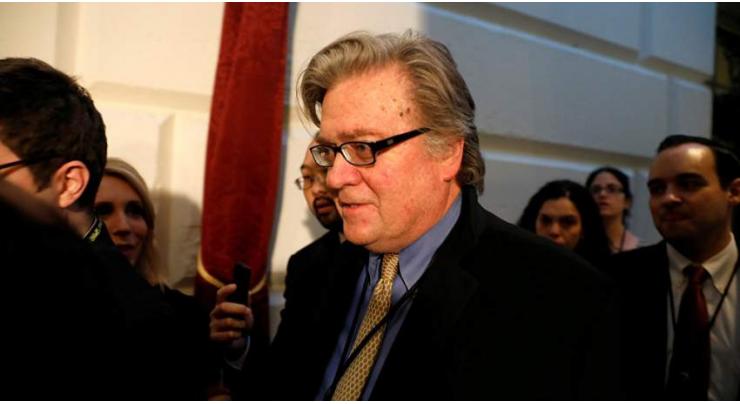
Bannon, Le Pen Join Anti-UN Migration Pact Meeting In Flemish Parliament
Mohammad Ali (@ChaudhryMAli88) Published December 08, 2018 | 09:06 PM

Former White House Chief Strategist Steve Bannon and Marine Le Pen, the leader of the French right-wing National Rally political party and a former French presidential candidate, arrived on Saturday to the Flemish Parliament in Brussels in order to attend a meeting against the UN Global Compact for Migration.
The meeting was organized with support of the Europe of Nations and Freedom a eurosceptic group of the European Parliament.
In the beginning of the meeting, its host listed the main provisions of the pact, which is expected to be formally endorsed at an intergovernmental conference in the Moroccan city of Marrakesh in the beginning of the next week.
The host's claim that the pact was a "suicidal" one for Europe was met with applause.
Representatives of the right-wing Flemish party Vlaams Belang are also taking part in the meeting as they firmly oppose the idea of Belgium signing the pact.
Earlier in the week, the largest party of the Belgian ruling coalition, the New Flemish Alliance, threatened to leave the coalition if Belgian Prime Minister Charles Michel signed the UN Global Compact for Migration in Marrakesh.
The UN Global Compact for Migration, finalized on July 13 by all UN member states except the United States, represents the international community's attempt to establish a common global approach to all aspects of international migration. The pact comprises 23 objectives for better managing migration at local, national, regional, and global levels.
The landmark pact has raised controversy across Europe as certain countries believe the deal will put restrictions on their national migration policies.
Related Topics
Recent Stories

Tennis: ATP Barcelona Open results - 1st update

Swiatek's perfect 10 in Stuttgart as Vondrousova stuns Sabalenka

Arandu's roads closed due to flooding

Oil tanker catches fire in Islamabad’s Blue Area

Pakistan committed to ensure safety of foreign nationals: FO

Tennis: WTA Stuttgart results - 1st update

Four passengers injured as train hit an empty vehicle

Over- speeding bus crushed to death two bike riders

Turkey's Freedom Flotilla ready to set sail for Gaza

French teen dies from heart failure after knife attack near school

Iranians appear unfazed by Isfahan blasts

UAF celebrates Int'l Chinese Language Day
More Stories From World
-
Togo lawmakers approve contested political reform
27 minutes ago -
NATO must choose 'whether we indeed are allies': Zelensky
28 minutes ago -
US House to vote on Ukraine, Israel, Taiwan aid package
28 minutes ago -
Calls for calm after reported Israeli strike on Iran
58 minutes ago -
IMF calls on EU to deepen single market integration to boost growth
58 minutes ago -
Second Ecuadoran mayor killed ahead of anti-crime referendum: police
58 minutes ago
-
Oil, gas drilling blocked in Alaska wilds as Biden seeks green cred
2 hours ago -
Man sets self on fire outside Trump trial
2 hours ago -

Turkey's Freedom Flotilla ready to set sail for Gaza
3 hours ago -

French teen dies from heart failure after knife attack near school
3 hours ago -

Iranians appear unfazed by Isfahan blasts
3 hours ago -

Ecuador mayor killed ahead of anti-crime referendum: police
4 hours ago



